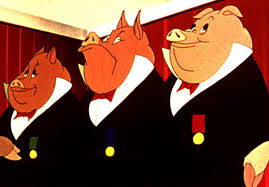Oligarchies
“All animals are equal, but some animals are more equal than others” (George Orwell, Animal Farm).

Perhaps somewhere deep in the Amazon rainforest or the jungles of New Guinea there exists a yet-undiscovered community of people living in blissful harmony and governing themselves by consensus. I hope so, because government today seems to slant inexorably toward oligarchy, where “power [is] exercised by a small and privileged group for corrupt or selfish purposes” – people who seek to insulate themselves from oversight by the masses and from any regulation of their activities that might obstruct their access to privilege and power.
This seems to hold true whatever the form of government – from Orwell’s Stalinist dystopia to the College of Cardinals. In this country, a tiny percentage of people own a growing share of the nation's total net worth (top 1% own 35%; top 5% own 63%); and they are using their wealth to influence the political process in ways we haven’t seen since the late 19th century – when, wrote one critic, “Standard Oil did everything to the Pennsylvania legislature, except refine it.”
With the election still over a year away, “fewer than four hundred families” have already given almost $200 million to the presidential candidates, much of it anonymously. It’s possible, I suppose, that they are just public-minded people exercising their Supreme Court-given right to free speech without wishing to draw attention to themselves. But these folks know the value of a dollar, and it seems more likely they intend to get what they pay for.